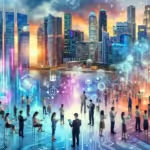Exploring the Impact of Generative AI on Modern Society
In the rapidly evolving landscape of technology, **generative AI** stands out as a revolutionary force with profound implications for business, politics, and society. As we delve into its transformative potential, it’s essential to understand how this cutting-edge technology operates and influences different sectors.
Understanding Generative AI
Generative AI refers to a class of artificial intelligence systems capable of creating content, such as text, images, audio, and even video. These systems leverage massive datasets and sophisticated algorithms to produce outputs that mimic human creativity and ingenuity. Technologies such as OpenAI’s GPT-4, for instance, exemplify how generative AI can generate highly coherent and contextually relevant text.
The Mechanics Behind Generative AI
– **Data-Driven Models**: Generative AI models are trained on vast datasets, allowing them to learn patterns, nuances, and contextual cues.
– **Neural Networks**: These models rely heavily on artificial neural networks, particularly deep learning architectures, to process and generate content.
– **Continuous Learning**: The adaptive nature of generative AI enables it to improve over time, refining its outputs for greater accuracy and creativity.
The Business Transformation Through Generative AI
Generative AI is reshaping the business world, offering new avenues for innovation and operational efficiency.
Enhancing Creativity and Innovation
Businesses are leveraging generative AI to fuel creativity, enabling the rapid prototyping of products and services. By automating design and content creation processes, companies can significantly reduce time to market and enhance their competitive edge.
Streamlining Operations
– **Automated Customer Support**: AI-driven chatbots and virtual assistants are transforming customer service, providing instant, accurate responses and freeing up human resources for more complex issues.
– **Predictive Maintenance**: In manufacturing and logistics, generative AI systems predict equipment failures and optimize maintenance schedules, minimizing downtime and costs.
Data-Driven Decision Making
Generative AI empowers businesses with in-depth analytics and actionable insights, enabling data-driven strategies that enhance decision-making processes. This ability to analyze vast amounts of data at high speeds is crucial for gaining a competitive advantage.
The Political Ramifications of Generative AI
The influence of generative AI extends to the political arena, where it is poised to redefine how elections are conducted and policies are formulated.
Revolutionizing Campaign Strategies
Political campaigns are increasingly harnessing generative AI to tailor messaging and reach target demographics more effectively. By analyzing voter data, AI systems craft personalized content that resonates with individual voters, potentially increasing engagement and turnout.
Risks and Ethical Considerations
– **Misinformation and Deepfakes**: The capability of generative AI to produce convincing fake content poses significant risks in spreading misinformation and manipulating public opinion. This challenges the integrity of information landscapes, emphasizing the necessity for rigorous ethical standards.
– **Privacy Concerns**: The use of vast amounts of personal data for crafting targeted messages raises privacy issues, necessitating stricter data protection laws and policies.
Societal Implications of Generative AI
Generative AI is reshaping societal norms and interactions, ushering in a new era of digital engagement.
Transforming Education
In the educational sector, generative AI facilitates personalized learning experiences. By assessing individual learning patterns, AI systems can tailor educational content to suit students’ unique needs, promoting more effective learning outcomes.
Cultural and Artistic Innovations
– **Art and Music Creation**: AI systems are breaking new ground in art and music by generating novel pieces that blend various styles and genres. This democratization of creativity enables new forms of artistic expression.
– **Content Personalization**: Media and entertainment industries are benefiting from AI-driven content personalization, offering audiences tailored experiences that speak directly to their preferences.
Challenges and Opportunities
While generative AI presents numerous opportunities, it also brings challenges that must be addressed to ensure its responsible use:
– **Bias in AI Models**: AI systems can inadvertently perpetuate existing biases present in their training data, necessitating ongoing efforts to create more equitable and inclusive algorithms.
– **Regulatory Frameworks**: The rapid advancement of generative AI demands robust regulatory frameworks to govern its application and safeguard against potential misuse.
Preparing for a Generative AI-Driven Future
As generative AI continues to evolve, preparing for its widespread adoption involves collaboration across industries, policymakers, and society. By fostering open dialogue and prioritizing ethical considerations, we can harness the transformative potential of generative AI to create a future that benefits all.
In conclusion, generative AI stands as a cornerstone of modern innovation, driving significant changes across business, political, and societal landscapes. Its capacity to revolutionize industries and redefine human experiences makes it a pivotal force in shaping the future. As we navigate this transformative journey, embracing both the possibilities and challenges of generative AI will be crucial in crafting a world that thrives on technological advancement and human creativity.








